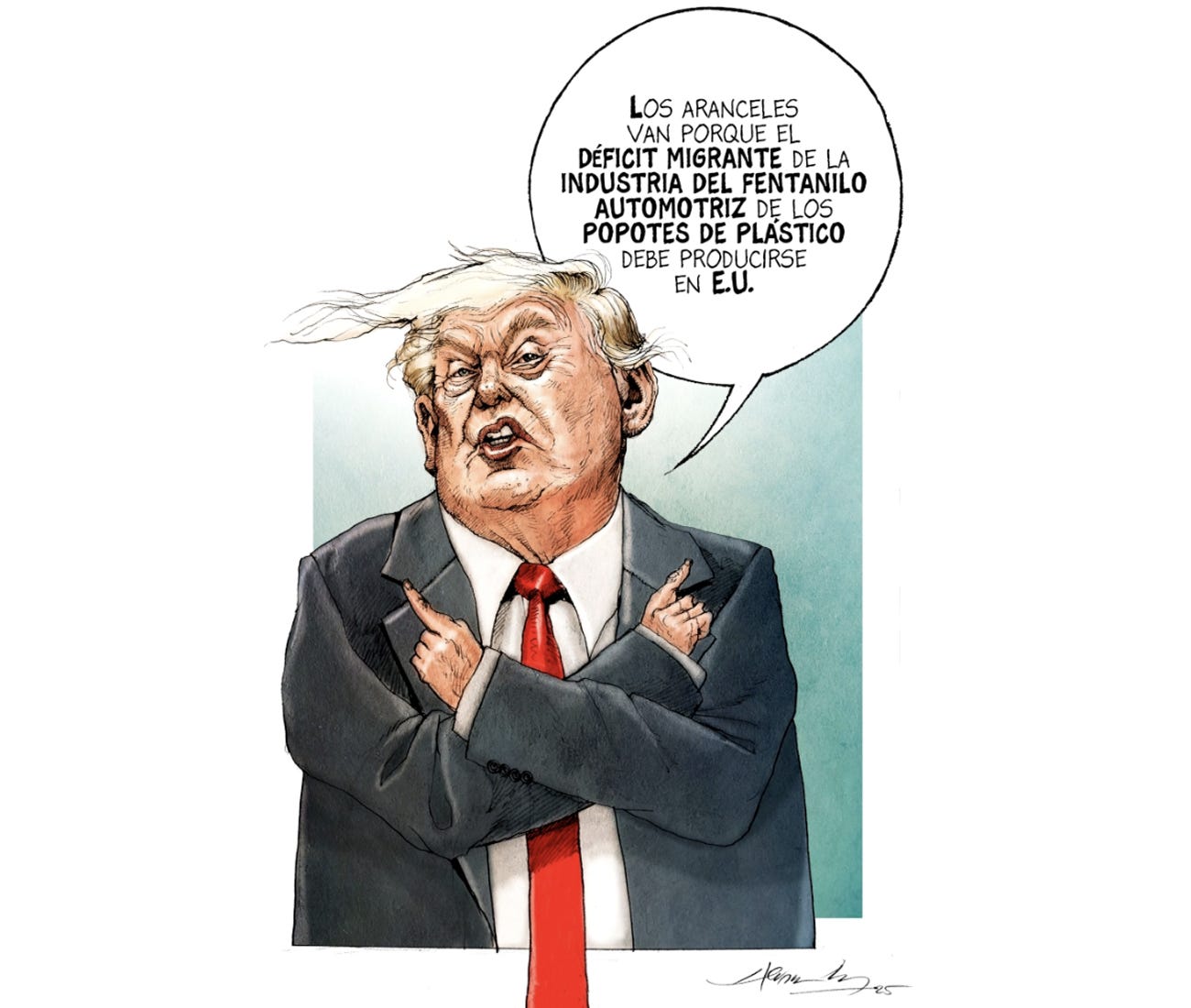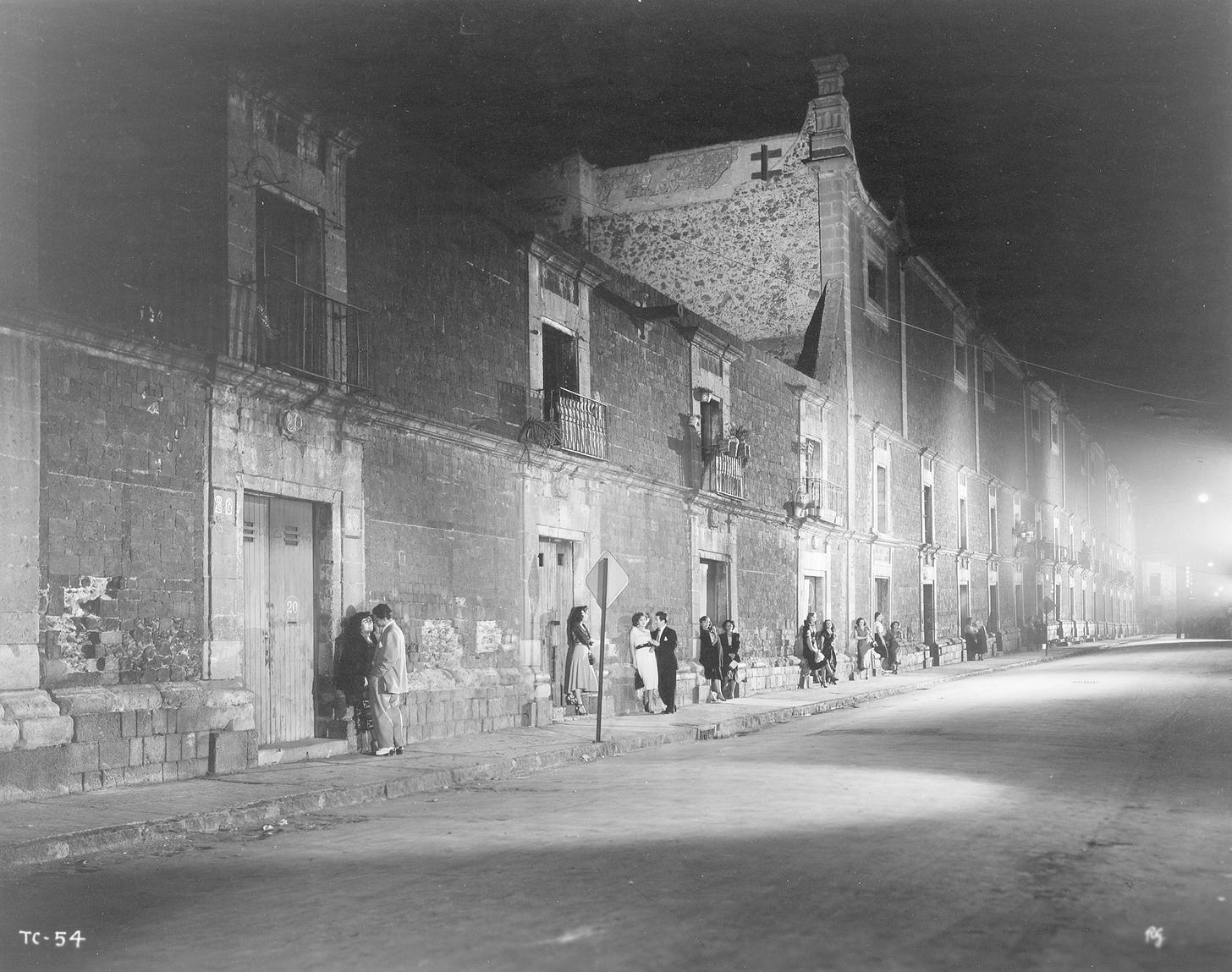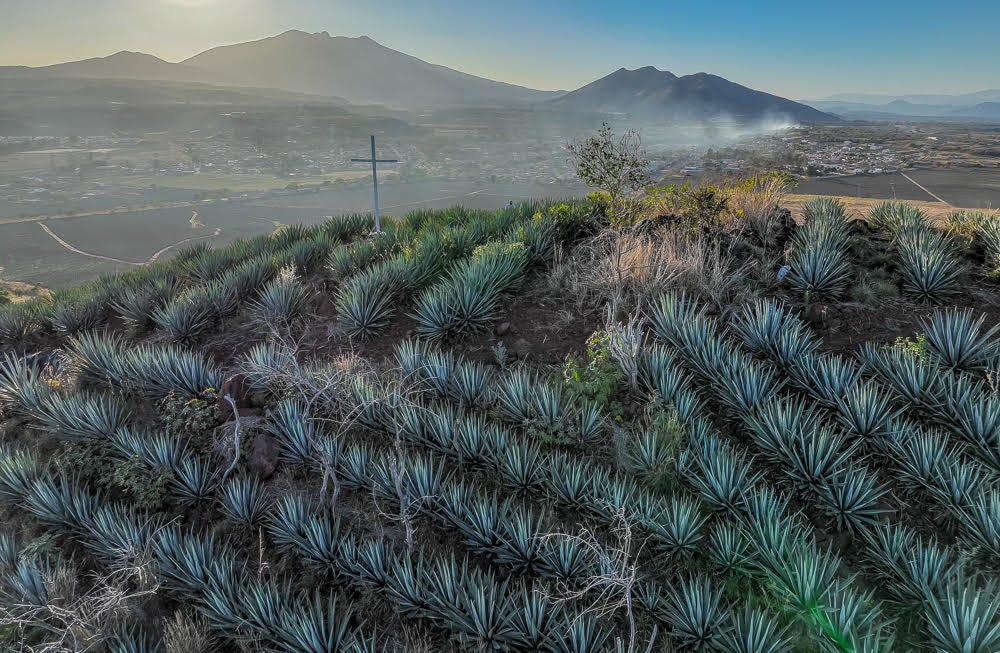07 Mar 25 | Trump's tariffs, end of the neoliberal era?
Also in this edition: Mexican female filmmakers and rockers on International Women’s Day. Argentina: repudiation of austerity measures. Mexican Tequila: regulatory negligence, official paralysis.
Lea La Jornada Internacional en español aquí.
Tariffs: Bad for everyone, or an opportunity?
President Donald Trump's decision to impose and then lift new tariffs on Mexico and Canada, with a threat of more in coming weeks, has triggered recriminations and tariffs from other countries, but some experts believe this crisis also offers Mexico an opportunity to redefine its industrial strategy and international relations.
Many see these new tariffs as a short-term measure that Trump hopes will distract his domestic political base and force other countries to bend to his will on migration, drug trafficking and even free trade. The tariffs will undoubtedly raise prices for American consumers and impose huge costs on farmers, the auto industry and other sectors of the U.S. economy.
But in the short term, if the tariffs on Mexico and other countries take effect, the consequences will be devastating. “For our country, they will slam the brakes on economic growth and lead to job losses and possible factory closures. To confront the situation, it will be necessary to readjust plans and programs to support the sectors most impacted by the New York millionaire’s crazy and transgressive decision,” writes La Jornada in an editorial. Specifically, twelve states in Mexico get more than 20 percent of their gross domestic product from industries vulnerable to the possible application of tariffs. At the same time, as a result of Washington’s actions, Mexico will have to reevaluate the decision to craft an economic strategy based on nearshoring. Mexico and many other countries are now asking: What does this man want?
For the moment, President Claudia Sheinbaum says that Mexico remains open to dialogue, but she cautions the country will take action to protect its industries and workers. In the Senate, her party suggested that protectionist measures from the U.S. will require a commitment to multipolarity, to the broadening of trade and economic relations with other nations. Meanwhile, neoliberal parties in Mexico suggest that the country should seek a meeting with the Republican-dominated U.S. Congress to create a counterweight to the tariffs.
But the crisis could also offer new economic alternatives. “The reindustrialization of the US and the exclusion of Mexico offer a unique opportunity for Mexico to redefine its global position,” writes José Romero. “It is crucial to design a clear strategy that promotes internal growth and reduces external dependencies,” he stressed, and even proposed that Mexico consider withdrawing from the USMCA.
Sergio Ley López, Mexico's former ambassador to China, is more blunt, arguing that it would be absurd to give in to tariff threats by cutting off essential supplies and completely distancing Mexico from China, which is set to become the world’s largest market. Enrique Dussel Peters adds that Mexico should not fall into the trap of opting for the United States or China, but rather aim for triangulation.
It would be nearly impossible for Mexico to completely exit the market that accounts for more than 80 percent of its exports, but in a new multipolar world with fresh incentives like the BRICS, there could be opportunities to reduce the dependency created by decades of neoliberal governments in Mexico, write several opinion columnists in La Jornada.
In fact, during the years when free trade has been the strategy, Mexico has become increasingly dependent on U.S. imports of basic grains, writes Ana de Ita. Could this be an opportunity for change? Union leader Napoléon Gómez Urrutia suggests that in this time of uncertainty, democratic unions in Mexico, Canada and the United States have a responsibility to speak up and defend the rights of workers in the steel and metal industry.
In February, the Mexican Senate repealed former President Enrique Peña Nieto's neoliberal privatization reform and returned control of Petróleos Mexicanos and the Federal Electricity Commission to the people. Ultimately, the U.S. imposition of tariffs is a decision of a foreign government. But perhaps it is also an opportunity to advance the Fourth Transformation in Mexico, and create new Mexican policies that are not subject to the neoliberal schemes of the past. It is worth remembering that at the beginning, the North American Free Trade Agreement was described as “the neoliberal padlock”.
Sign up here to receive La Jornada Internacional in your inbox. It’s free.
The Sentence
“A politician who is poor is a poor politician.”
Comment attributed to Carlos Hank González, which could be the slogan - in official English - of the current tenants of the White House.
In case you missed it
◻️ Matilde Landeta, pioneer of Mexican film, portrayed brave and resilient women. Her fiction films, Lola Casanova, La Negra Angustias, Trotacalles and Nocturno a Rosario, are testimonies of struggle and vindication in an industry dominated by men.
◻️ Mexican women rockers are a wave that can no longer be stopped, says Norma López. Sirenas al ataque: Homenaje a roqueras mexicanas was a concert dedicated to trailblazing women who for decades have been determined to be frontwomen, in an industry with an edge that has hardened into misogyny. ▶️ VIDEO
◻️ Mexico's lawsuit against U.S. guns arrives at the Supreme Court. The judges were skeptical of Mexico's case against gun makers and distributors, but the hearing raised awareness of the case and the evidence that U.S. government data proves that U.S. arms trafficking fuels drug violence in Mexico.
◻️ Argentina: thousands protest the collapse of the health sector. A wave of price increases has led 60 percent of the population to decide they can not buy anything but food, while Milei’s government is pushing through brutal cuts and dismantling social welfare programs. But the protests against the austerity policy continue. At the end of February, doctors, nurses and patients organized a Federal March for Health.
◻️ Brazil: the people have new aspirations. In his first two terms, Lula brought large sectors of the population out of misery and poverty, creating a new lower middle class. Recently freed from poverty and misery, that class has new aspirations. At a time when Lula's relationship with Congress is not good, he is no longer able to do what he promised in the campaign that led to his victory over the unbalanced, ultra-right-wing Jair Bolsonaro.
◻️ Miami and Cuba: the problem is in Washington. U.S. policy towards Havana is not the most important issue for Cuban Americans, and today, immigrants do not leave the island for ideological reasons, according to experts in Miami. Polls show that the economy is the most important political issue for the Cuban American community of all ages, except for the oldest, who consider access to health care to be their priority.
◻️ Drunk on tequila: regulatory negligence, official paralysis. With the price of agave having plummeted 80 percent, and the warehouses full, the question is no longer if the Mexican government will act, but how many jobs and families will be affected before the government decides to intervene, writes tequila industry expert José de Jesús Hernández López.
◻️ Caro Quintero and other drug lords sent to the U.S. In an unprecedented move to underscore its willingness to cooperate with Washington in the fight against drug trafficking, the Mexican government handed over 29 drug lords to its “partner,” including Washington’s most wanted, Rafael Caro Quintero, who is accused of ordering the assassination of a DEA agent four decades ago. Though Washington welcomed the arrival of the capos, Trump decided that it was not enough to avoid the application of tariffs. For Julio Hernández López, the event marks a change in policy on both sides of the border.
◻️ Arnulfo Aquino, a promoter of political art and an activist in social movements. The engraver, designer and teacher from Oaxaca, who died in March, belonged to the Grupo Mira from 1977 to 1982. His creations avoided the stereotypes of some political art, and nourished the struggles of his era.
🎥 What we’re watching
This cinema project is the largest presenter of Latin American film in the United States. Their site includes a selection of films that can be viewed online.
Did you receive this email from another reader?
Sign up here to receive La Jornada Internacional in your inbox. It’s free.









